#and like. kamikaze is not a *good* strategy in any game but it's fun and especially for level 1 it's fairly cheap since moc is 6 embers
Explore tagged Tumblr posts
Text
Treasure deck this, defensive deck that, where's the love for kamikaze decks? What if I want to do a medium run with the standard deck + 2 extra moments of clarity and a pork chop power? What if I want a little whimsy in my life? /lh
#watching jevin discount the benefits of ethereal cards like D':#and like. kamikaze is not a *good* strategy in any game but it's fun and especially for level 1 it's fairly cheap since moc is 6 embers#so even if you do 2 easy runs and get axe of the screaming void twice you could possibly get 1 tome + a card/ 3 tomes instead of *maybe* 1#tome. oor you get uncommon cards and use ethereal cards to pad out your deck until the difficulty level equalizes and you start doing#kamikaze runs again for the next level up#n e ways. catch me trying to figure out how to set up everything for the world download soley so i can play DO 2-- that game is simply too#insane. i will suck so badly at it <3#hermitcraft#decked out 2
14 notes
·
View notes
Text
Let’s Talk Flavor: Commentary
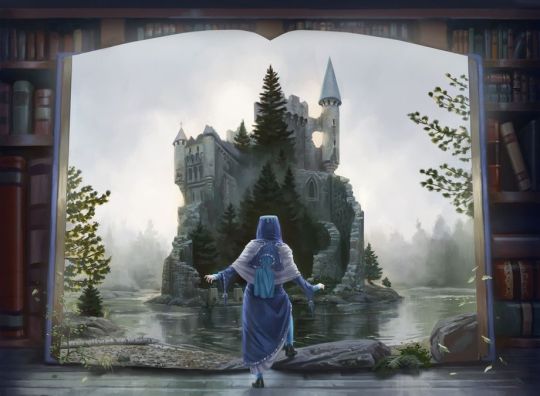
I would say overall that most of these cards were fantastic and a great number of the story ideas were good. There will be parts where I suggest edits, and the thing about story edits is, well, it doesn’t impact game design. That’s the thing about the Fair and the thing about Magic in general: the whole thing could be replicated with number systems and program lines and it would be the exact same. It’s the fact that a creature has Flying, or that a spell is made of Lightning that makes the game exciting. This was an interesting experiment.
Let’s talk about cards!
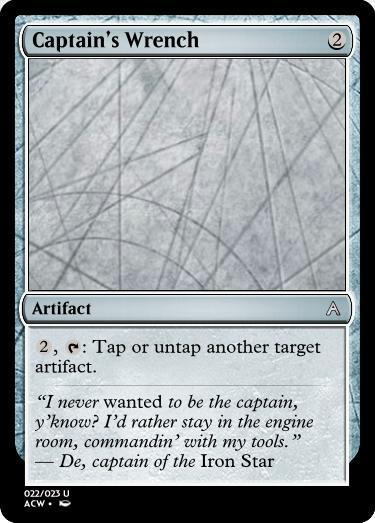
@ace-hobo — Captain’s Wrench
This is a perfectly fine card. I like the “fixed” Voltaic Key style, the moderate power level. It’s a card that someone would probably be middling in artifact decks but fine in budget builds. I’m sort of feeling an Ixalan vibe, maybe with a little steampunkishness. I get that the wrench belongs to De, but it’s a little confusing regarding why they have the wrench. If they’re the captain and they’re not in the engine room, why is the card depicting a tool that would suit them better if they never left the engine room? Maybe the story should be about how DESPITE their captain status, they spend time in the engine room. It’s an easy enough tweak.
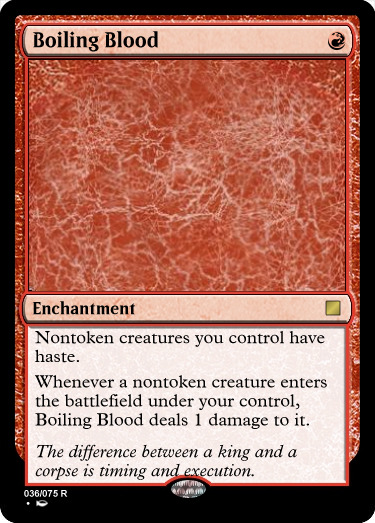
@cas-420 — Boiling Blood
The card is pretty good. It’s very aggressive and has synergistic potential. I really don’t see where the flavor is tying into it. I am favorably inclined towards your text, in concept. I can see where you were making the pun on “execution.” The wording is clunky with the repeated syntax, and could have just used the execution line. But what does that have to do with the card? The flavor evokes dissent, protest, retaliation. The flavor of the card evokes speed, purpose, initiative. It’s not a perfect tonal match. I would save the text for a different card with a clearer purpose
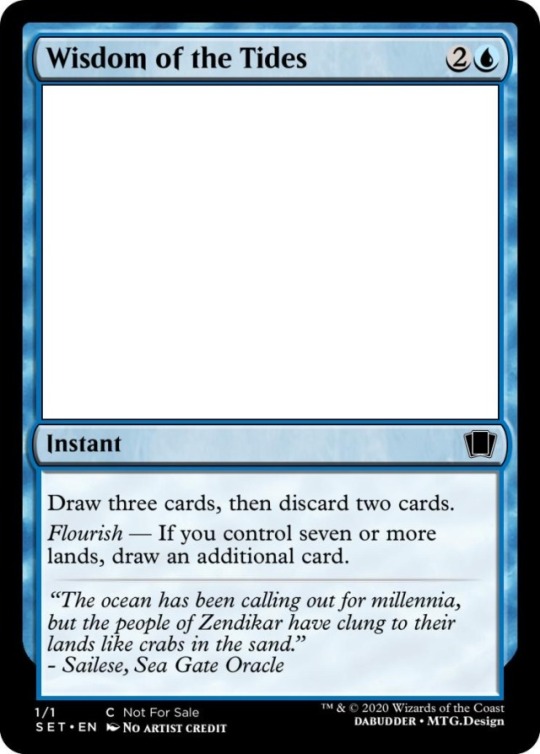
@dabudder — Wisdom of the Tides
In terms of card wording, I believe you’d be looking for something like Mysteries of the Deep, where you have an “instead” wording — unless you’re supposed to draw an additional card after? It’s a little confusing how you have it now. Still, Flourish is a fine mechanic, executed well. This was pretty close to being a runner-up. I like the nod towards crabs. We’ve been having a crab mood lately. Overall, not bad. Might need to be four mana, but that’s me being cautious.
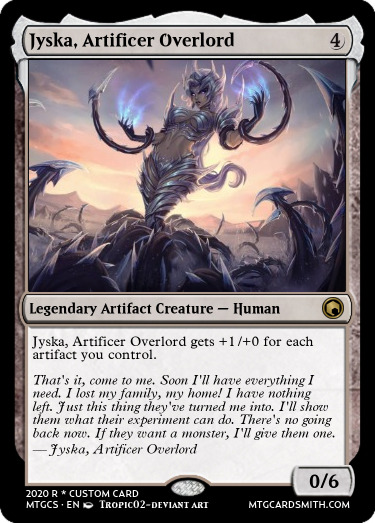
@deafeningsandwichpeach — Jyska, Artificer Overlord
The name is probably the best thing about this card, and it’s fair enough for a legendary creature. Considering that this is essentially the Nim ability from original Mirrodin and that it’s a vanilla creature otherwise, I would contest that you’re severely overestimating the power level of this card. It’s not as strong as it seems. In terms of flavor text, this is basically exposition. I won’t dissuade you from story-rich cards, but there’s too much information presented in a manner that overloads the reader. Simplify, punch, beat, punctuate. In terms of presentation, the whole block should be in quotes, and you don’t need to attribute the quote if the character’s on the card itself.
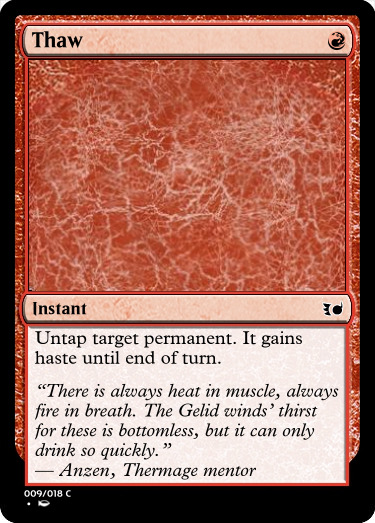
@demimonde-semigoddess — Thaw
Great name, great snow flavor. I can see this in the tundra wastes, something emerging from the snow, bursting out. I had to do some digging. As it turns out, “gelid” is a real English word I had no idea about! I thought from the shackles and your flavor text that it was some Coldsnap lore. In terms of the text itself, it’s not bad. It’s just that the two statements are somewhat disconnected. They work both on their own, but together, they don’t gel well. Still, bonus points to mechanical flavor for an anti-ice feel.
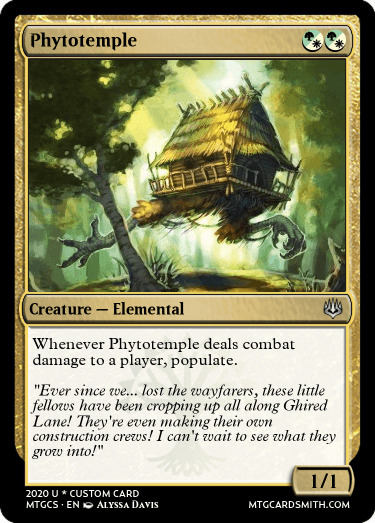
@dimestoretajic — Phytotemple
The card is pretty funky for an uncommon, pushed but not busted. I’d call it a pain in the butt but no more than Wayfaring Temple. Ah, I see, the wayfarers, an homage. But there’s a lot I don’t understand. Who lost the wayfarers? Who’s saying this quote? Why did the phytotemples start appearing in general? Did the original wayfaring temples break into them? What does Selesnya have to do with construction crews? How is that related to the phytotemple’s physiology and motivation? Most importantly, why is there a street named after a Selesnya dissident? I think you should have focused on one specific area of the card’s backstory.
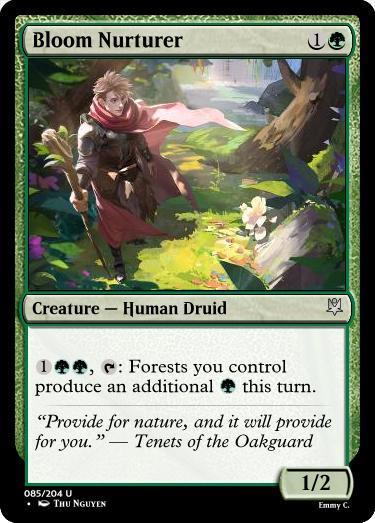
@emmypupcake — Bloom Nurturer
I was really surprised that there wasn’t a card already named this. In terms of card wording, look at High Tide or Bubbling Muck; I think it would read “Until end of turn, whenever you tap a Forest for mana, add an additional G.” The quote doesn’t light my world on fire, but it fits well and reads well. Just remember to indent the attribution with shift+enter. Overall? Good enough.
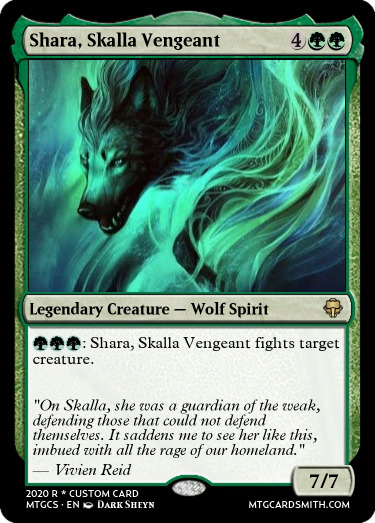
@fractured-infinity — Shara, Skalla Vengeant
I had to do a little digging, but I like how you incorporated Vivien’s lore in here. That said, Skalla is also, well, destroyed, presumably forever. Where did the spirit come from? Is it wandering around Skalla? In that case, did Vivien go back? Why? That raises a couple questions. In terms of this card, it’s broken. In anything but the most pushed Commander formats, it’s three mana to deal seven damage to any creature you want with minimal repercussions. Any prevention makes her impossible to deal with. In limited, she would sweep unfairly.
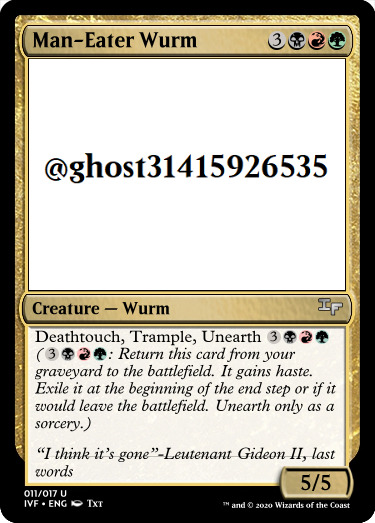
@ghost31415926535 — Man-Eater Wurm
Firstly, I would like to apologize for the flavor bar being in the middle of the line. That’s my bad. Let’s talk about the rest of the card. In concept, it shouldn’t be too overpowered. But deathtouch and trample together create complex rules baggage that many casual players simply don’t understand. Nine times out of ten, they’ll never be printed together. Seeing that this is exactly how you submitted it, consider for next time: Only the first keyword needs to be capitalized in a string. Something like Unearth needs its own line. The flavor text is standard enough. Just remember that quote attribution also needs its own line.
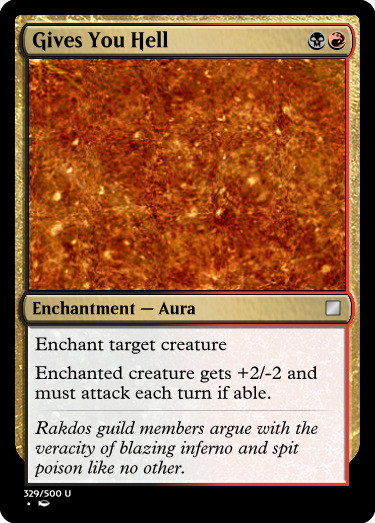
@gollumni — Gives You Hell
I love the name here. I got that All-American Rejects song stuck in my head now. Remember that one? Anyway. Firstly, you don’t need to put “target” there; “Enchant creature” implies it. Secondly, and least importantly, don’t forget you can add watermarks in MSE! Thirdly, the flavor text. I get it, but it doesn’t flow great. If there was some wordplay to be done on fire-spitting and whatever turn of phrase you used, like, “spitting poison” in the literal sense — I don’t know, I just expect something a little more concise. It’s a great concept and has the potential to be very funny, so points there. Also, the card itself? Fantastic.
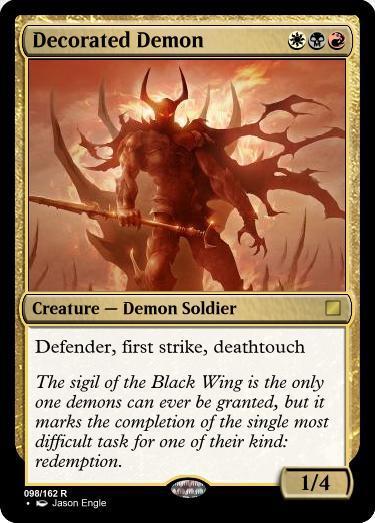
@greensunzenith — Decorated Demon
Liking the name. I don’t like how this card has to be a rare. It’s more of an annoyance than anything. It feels like a card that prevents decisions. It’s not aggressive, nor is it particularly interactive. Conceptually it works, but I’m not in favor. The flavor text is a bit of a head-scratcher. The real question is: who is giving demons sigils? How do they become redeemed? On what world CAN demons become redeemed? This isn’t a Bant thing, is it? I’m a little lost as to the specifics, since it doesn’t play into any tropes and doesn’t inform the world in a recognizable way.
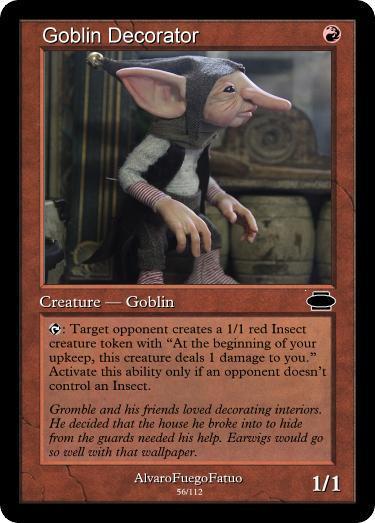
@i-am-the-one-who-wololoes — Goblin Decorator
If the flavor text had simply been, in quotes, “Earwigs would go so well with that wallpaper!”, then this card could have been a runner-up. Also, this should definitely be an uncommon. The effect is awesome and powerful and annoying and plays into a variety of strategies. Still, the flavor text is just...too much. It’s a lot of text that tells a story that doesn’t really need to be told. We get enough from the name and that last sentence, combined with a fun ability that matches the card. That’s all we need! Gotta simplify.
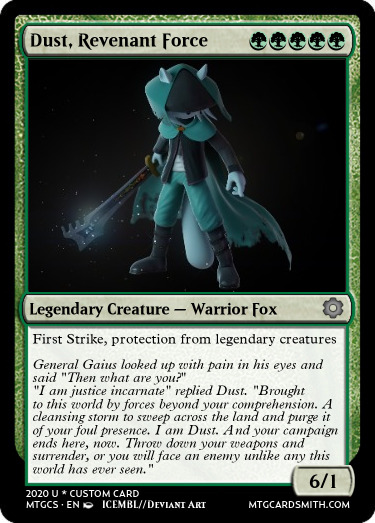
@ignorantturtlegaming — Dust, Revenant Force
For future cards, I would highly recommend reading up on design philosophy, what Magic’s colors are about, and how cards come into being. There are a lot of questions that this card raises, and a lot of things that need to be edited.
Green doesn’t get first strike, certainly not mono-green.
Why does this card cost five green mana? What does it provide for the limited/constructed environment?
It should be “Fox Warrior.”
The first thing about the flavor text is that there is far too much of it. It’s exposition for exposition’s sake. Fine in a high fantasy short story, but not on a Magic card.
The second thing about the flavor text is that Dust appears to be a white-aligned character through their actions and themes. I don’t feel anything green about them.
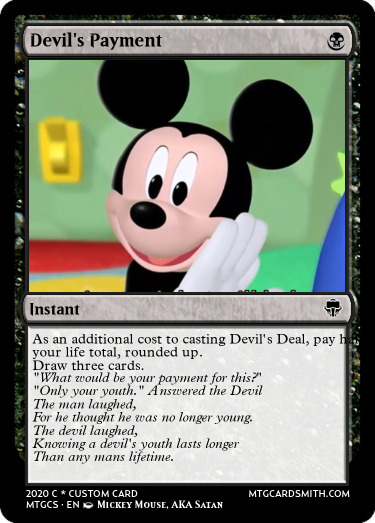
@juggernaut-is-a-metalhead — Devil’s Payment
I’m going easy on card art attribution since, well, it’s Disney and they are indeed evil, but in the future, please attribute it to the show itself and/or the director/copyright holder. So, the card itself. Is it supposed to be a common? Is it an homage to Cruel Bargain and Infernal Contract? This certainly isn’t a common effect, and for one mana, well, I don’t know what to say about this card. In terms of the flavor text, why is everything separated in lines like a poem? It’s way too long to fit into a card with three lines of rules text already. I don’t really understand what it’s even trying to say. The devil asked for the MAN’S youth. What does that has to do with his own? And why is it only sometimes capitalized? I don’t really understand this at all.
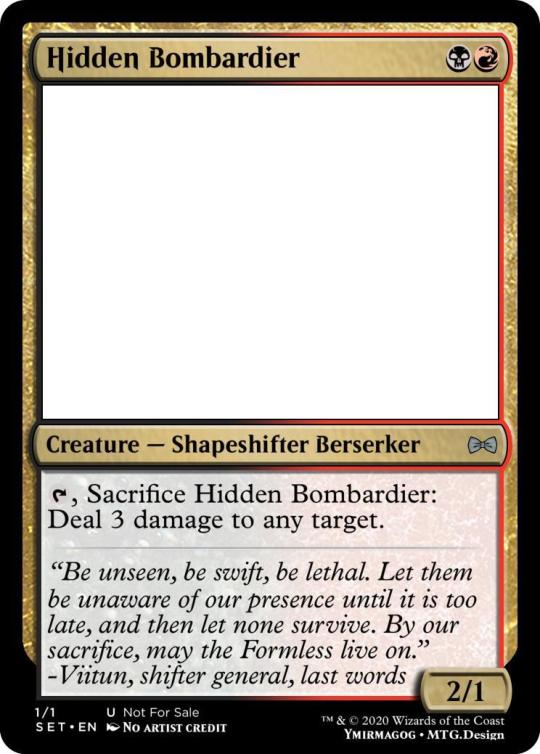
@koth-of-the-hammerpants — Hidden Bombardier
Great name. For the card text, it’s powerful, arguably fine in the right format, but very strong regardless. It also needs to say “It deals 3 damage” instead of just “Deal.” Gotta get past the 90′s, erryone. So now, the flavor text... I kinda get it? I just don’t understand what makes this card a shapeshifter. I don’t understand the world in which shapeshifters exist. This card feels like a Goblin. It’s an interesting kamikaze take, if a little too flowery and on-the-nose. It doesn’t exactly inform me, and it doesn’t exactly excite me.
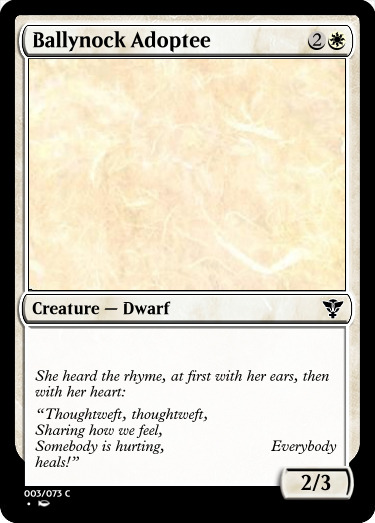
@mardu-lesbian — Ballynock Adoptee
I had to look up to make sure that there were dwarfs on Lorwyn, and by golly, you’re right, there are! In RW hybrid in Eventide, anyway. And that brings up to a major story problem. By the introduction of dwarfs, the world has already plunged into Shadowmoor, and the thoughtweft has already been replaced with the mindweft. I’m stealing this from the wiki, so berate me if I’m wrong, but I always got the sense that the kithkin were highly xenophobic regardless of where the Great Aurora was. The jarring question that remains is: how does a non-kithkin creature become part of the thoughtweft/mindweft? It goes against what we know about the Kithkin and the world in general. If there’s a good explanation, I’m all ears, but I’m not convinced at this point in time.
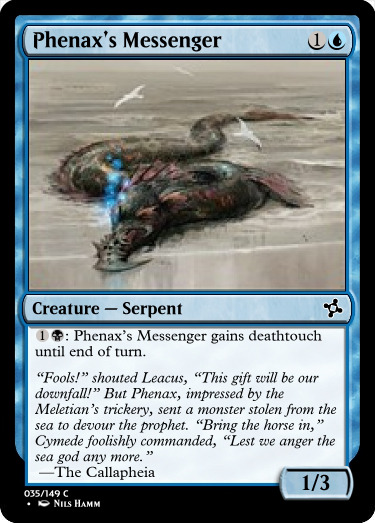
@mistershinyobject — Phenax’s Messenger
Bonus judge trivia time: I studied Latin in high school and a little in college. From what I can tell about The Callapheia from other cards bearing it’s flavor text, it is meant to evoke classical poetry from Greek and Latin epics. The lines are written four at a time, indented carefully. HERE is a link to all cards with “Callapheia” in the flavor text. The gist is, this card does NOT evoke that. There’s a lot of text, a lot of quotes, a lot of forced story that could have been way punchier if you just had stuff about a snake eating a prophet. I love the card as a limited filler. But yeah, gotta do more research into what it means to have certain aspects on your cards.
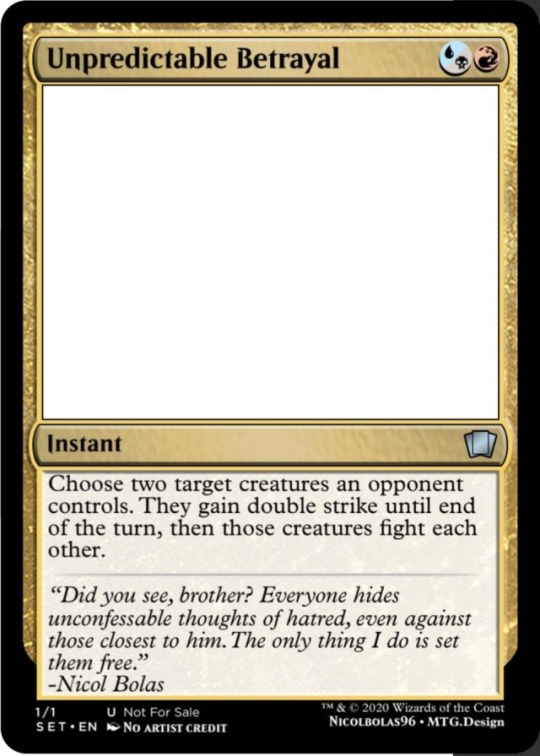
@nicolbolas96 — Unpredictable Betrayal
You know, it’s hard to evoke Nicol Bolas well in flavor text. He’s one of Magic’s major villains, a huge face of many sets, with years behind him. And honestly? You didn’t do a half-bad job in this flavor text. Props! That said, this card is way busted. For one, double strike doesn’t affect fighting at all, so that’s...something. For two, it would need to be three sentences; you did a run-on for that last one. For three, mechanically? This is a two-mana spell that eight times out of ten will absolutely destroy two creatures you don’t control. In limited, that’s insanely powerful. In any format that plays creatures, that’s usually amazingly good. There’s a reason spells like Blood Feud and Clash of Titans cost what they cost. Getting two creatures you don’t control to fight is powerful.
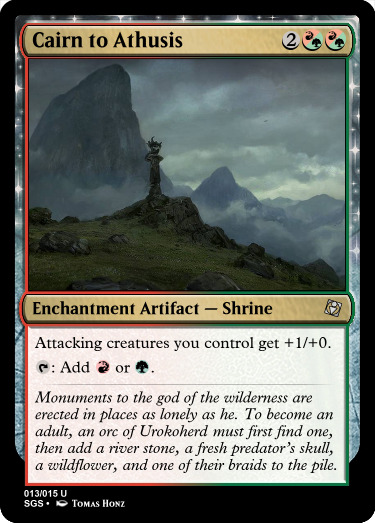
@nine-effing-hells — Cairn to Athusis
Actually, this card was one of my favorites from the contest. I’m a heavy Gruul player when I’m not playing cruel control, and I think the gist of this card is super interesting. You made it an enchantment artifact AND a shrine, giving flavor there as well to your new world. The only thing I would have changed is erasing that first sentence from your flavor text entirely. The second is so powerful that it stands on its own. It’s poetic without being overwrought, specific to the world and building off of known tropes. Also, it tells us that “orcs are RG in this world” which is a great mechanical touch. Just needed that little bit of trimming.
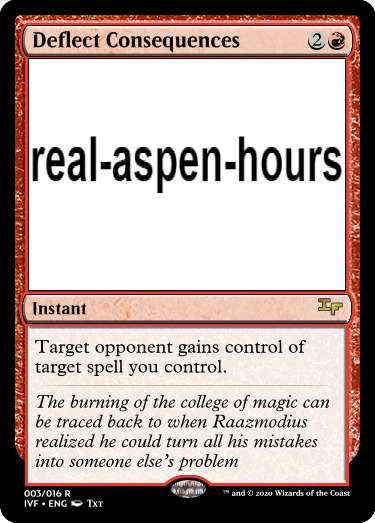
@real-aspen-hours — Deflect Consequences
Now this is an interesting card!... What practical use does it have? I’m curious what this has on something like Harmless Offering. I don’t believe that cast triggers will be affected. Maybe it would specifically go against things like “counter target spell you don’t control” or something, but if control changes... I’m uncertain of this card’s applications past the gimmick point. That said, it would be fun to cast a Leveler and have it enter the battlefield under an opponent’s control. I’m not in love with the flavor text. It’s fine. Doesn’t light my world on fire. A touch wordy. But it’s fine. Fits the name and the ability well, so that’s nice.
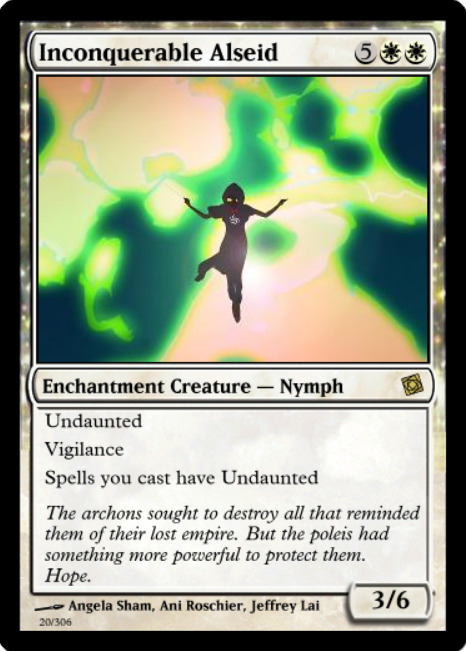
@reaperfromtheabyss — Inconquerable Alseid
Besides the fact that “Hope” should be lowercase and separated by a colon, the flavor text is really cool! I don’t like this card much. It’s honestly fine, and it’s an interesting commander card that could lead to some cool consequences, but there’s a reason Undaunted has reminder text. It doesn’t look good floating there by itself. There are some abilities that just need reminder text all the time, and Undaunted is on so few cards that it significantly needs this. I think I was a little too harsh on this card on my first go-around, but I haven’t warmed up to it yet. I think the great flavor could have been used on a simpler, more protective card.
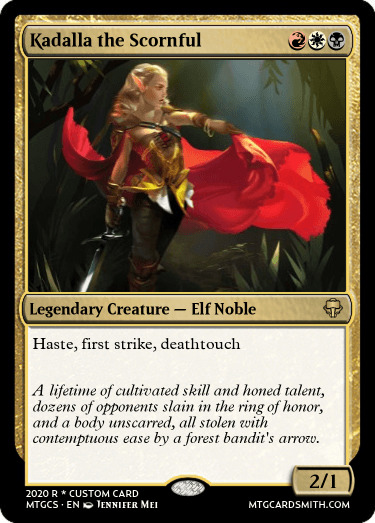
@scavenger98 — Kadalla the Scornful
I’m 99% sure it should go “First strike, deathtouch, haste.” Order of keywords is weird sometimes. So are creature types. I don’t really understand the world on which an Elf can be Mardu colors. It’s a stretch of the imagination to say the least. The card itself is...fine? I’d honestly make her an uncommon in today’s world. Yeah, she’s powerful, but she’s a 2/1 for three with all different mana symbols. Regarding the flavor, it’s well-worded, but it’s lengthy and doesn’t actually tell us anything about the character or the world. It doesn’t inform the card, and that’s its major misstep. Again, though, good writing.
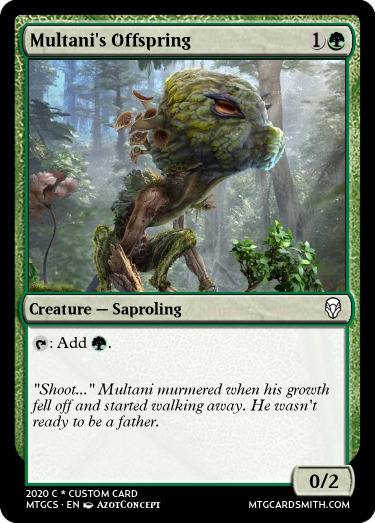
@shandylamb — Multani’s Offspring
A fine card, a funny flavor. Just so you know, though, “Saproling” is pretty much only relegated to the token, and this card would probably see print as a plant or fungus. And additionally, as nice as the pun is... What’s this card even trying to say in the story? Multani’s only known child is Muldrotha, and that’s deep lore as-is. As funny as this card might be, it really doesn’t mesh with a Magic feel.
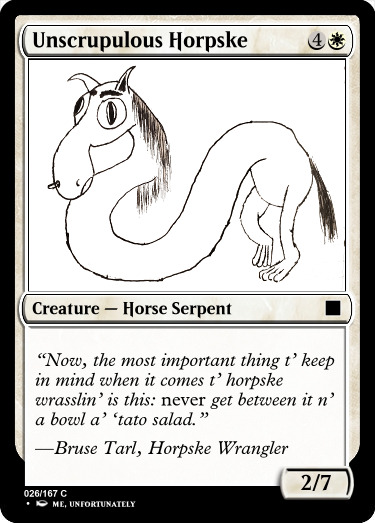
@starch255 — Unscrupulous Horpske
There are only two things I’m concerned about. Firstly: what about this creature makes it “unscrupulous?” What scruples does it have normally in its species? Secondly, this card is trying to make potato salad canon in the multiverse, and I don’t know if such a travesty would be allowed to happen. Potato salad is an affront to taste, no offense to the horpske.
Literally everything else about this card is a 10/10. I would also encourage you to work on a set symbol. Everyone should!
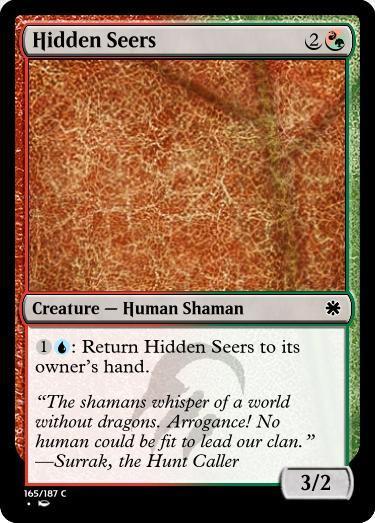
@teaxch — Hidden Seers
Interesting. So what timeline is this? Is this supposed to be, like, a return to Tarkir? Cool concept, I think, although I’m not entirely sold. After hearing the shaman’s whispers, why is Surrak’s first instinct to assume that without dragons a human would lead the clan? Wouldn’t the thought of a world without dragons evoke other thoughts and fears first? That’s my main hand-iffy-motion reason. This is also a supremely petty nitpick, probably the pettiest thing I’ve ever said about a card, but if this is the Dragon timeline then wouldn’t the watermark be the Atarka one instead of the Temur one?
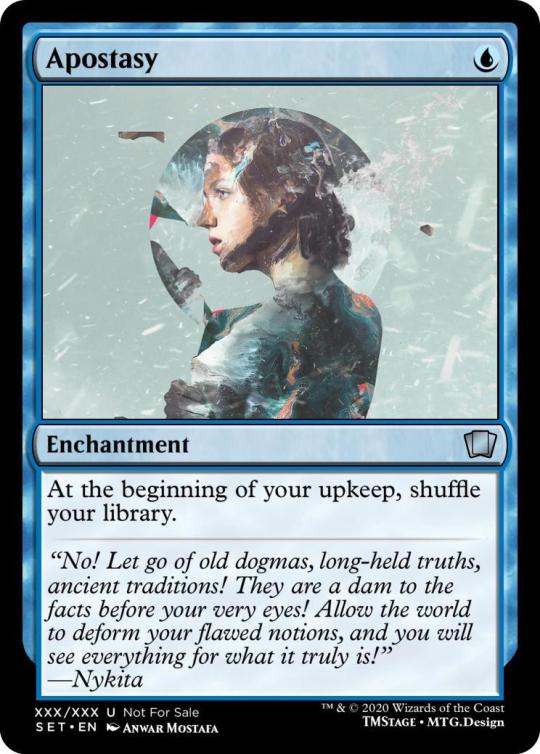
@tmstage — Apostasy
Everything about this card is good...individually. Great name, but what does that have to do with the ability? What is it trying to depict? What does shuffling your library have to do with religious dogma? And the flavor text feels overbearing. Nykita as a character is someone I’d like to know more about, but this card doesn’t tell me much about her. It’s mostly that the mechanics and the flavor don’t mesh in the least, and, well, it’s not a good mechanic. Shuffling is time-consuming, game-prolonging, and has no discernible benefit to the game outside of incredibly niche cards that mostly don’t affect you as the player. And the more I read the flavor text, the less it makes sense. “Allow the world to deform your flawed notions?” It sounds awesome, but what does it mean?
~
Thank you all for your submissions. New contest tomorrow.
18 notes
·
View notes
Text
E-26 Yoshida Taisei - Character Profile
Howdie folks. Yes, it's been ages since my last Profile, or post for that matter, but when work gets more and more hectic, especially if your project is a bottomless pit of dysfunction and staff leave the team you're on, it really drains enthusiasm away from some of one's hobbies. Anyway, like with Muramatsu, I liked how Matsui fleshed out Yoshida as the resident mechanic, and the way he synchronises with some of his other classmates too. Also, please note the different disclaimer from usual for the remaining 3 Profiles
The Baidu forumer from before hadn't posted any profiles beyond Yada's, so this time, main credits for scans of Yoshida's profile go to young-il-long-kiyoshi Screenshots of Yoshida's profile are in the following link:
Yoshida's profile
Furthermore, this time it's a direct Japanese -> English translation by me, but nonetheless, while I have endeavoured to keep things as accurate as possible, not everything may be successfully conveyed across
E-26 Yoshida Taisei (吉田 大成) – risking his life for his comrades, Class E’s shocktrooper
“You can blow away anything you don’t like with speed!!"
Description
A muscle head who likes to rush in, think later. As someone who is greatly considerate of his friends and comrades, he is willing to rely on students outside of the Terasaka Group as well.
A lover of bikes. While he’s certainly never rode on public roads, as a result of polishing his skills on premise (of his family shop), his riding technique can put professionals to shame.
He and Muramatsu are practically harmonised. No matter how difficult the situation gets, it is their creed to tackle it vigorously.
Code Name: Homebase (ホームベース), Sugino’s idea
This is probably a symptom of his occupation (as a baseball player), but every time he sees Yoshida he feels like he wants to step on him. Not out of anger or for any particular reason of course.
(TN: for those how hadn’t noticed it before, yours truly included, the contours of Yoshida’s face resemble a home plate from a baseball field)
Birthday: August 19th
Height: 173cm
Weight: 63kg
Blood Type: O
Favourite Subject: Technology
Worst Subject: English
Interests and special skills: Tinkering vehicles in general
Past Club: Railroad Research Society
Treasured Item(s): a Suzuki GSX 1300R Hayabusa (not yet taken onto public roads yet)
Favourite Food: Monster Energy (the drink)
Bento or Snacks: Snacks
Election Headline (from the 1st Popularity Poll): Kamikaze Striker Taisei
(TN: The phrase here, 特攻の大成, is a reference to Saki Hiroto’s work Legend of the Gale: Kamikaze Striker Taku, a Bosozoku/Yankee-themed manga that was serialised from 1991 to 1997 in Weekly Shonen Magazine, filled with lots of motorcycles too)
From Korosensei, Announcement of Results from the Periodic Exams (Main 5 subjects) (credits to young-il-long-kiyoshi)
In a word, his art and technology grades are magnificent! The embodiment of "what one likes, one will do well". Maths is useful when tinkering with bikes as well, so let's do our best together!
1st Trimester Mid-Terms: 265 points (140th place)
1st Trimester End-of-Terms: 347 points (89th place)
2nd Trimester Mid-Terms: 325 points (111st place)
Score breakdown
Show
1st Trimester Mid-Terms English: 43 points (147th place) Japanese: 55 points (161st place) Maths: 49 points (153rd place) Science: 60 points (80th place) Social Studies: 58 points (117th place) Composite Score: 265 points (140th place)
1st Trimester End-of-Terms English: 62 points (99th place) Japanese: 72 points (100th place) Maths: 64 points (100th place) Science: 76 points (32nd place) Social Studies: 73 points (58th place) Composite Score: 347 points (89th place)
2nd Trimester Mid-Terms English: 62 points (100th place) Japanese: 70 points (124th place) Maths: 63 points (105th place) Science: 65 points (63rd place) Social Studies: 65 points (90th place) Composite Score: 325 points (111st place)
Karasuma’s Assassination Aptitude (graded on a scale of 6)
Karasuma is captivated by Yoshida’s close combat style, the way he leverages his blessed physique like a human bullet. It appears his training has helped him excel at being alert of his surroundings, to the point that he can perceive the moments right before he touches his back from behind and the likes. He looks forward to his progress.
- His tackles that make full use of his body’s strengths are effective even against sturdy foreign opponents - During the Cops and Robbers game, Yoshida was able to sense Karasuma’s presence, when many students failed to do the same until he touched them. Is he an esper!?
Strategy/Planning: 2
Commanding/Leadership: 2
Execution (Ability to carry out plans): 5
Technique (Traps, weapons, preparations, etc): 5
Scouting/Intelligence Gathering: 3
Politics/Negotiations: 2
B*tch-sensei’s Fashion Check (credits to young-il-long-kiyoshi)
Seriously, he gives the vibe of a no-good middle school brat. Still, the way his fashion sense matches up with his age and stature isn't bad at all, right? From here onwards, as he becomes more and more experienced with the world, I expect that his tastes will continue to refine themselves.
School Uniform
Yoshida also does without a necktie. At 15 years old, he's probably at an age where he's not going to steal bikes nor want to tie somebody up.
(TN: Matsui is probably just jesting here)
Street Clothes
The only one within the Terasaka Group to dress himself smartly. Like with bike customs, clothes are a source of worry for what to spend his money on.
Character Relationships
- Nakamura Rio (addressed as Nakamura) -
The former delinquent Nakamura displays an interest in bikes to Yoshida simply because it looks refreshing, no ill intentions whatsoever. When Terasaka wrecked the bike that Korosensei had poured his heart into, both Yoshida and Nakamura criticised him. Nakamura often badgers him to "give me a ride!", but in truth Yoshida is feeling embarrassed, possibly due to the thought of going for a ride with a girl sitting behind his back.
- Kanzaki Yukiko (addressed as Kanzaki) -
The Terasaka Group usually carry an arrogant air around them, but in Yoshida’s case, it’s only when he turns to the seat on his left (ie Kanzaki’s desk) that his expression softens up.
- Hazama Kirara (addressed as Hazama) -
Hazama notices that Yoshida softens around Kanzaki, wearing a broad grin as she watches him from behind (she’s seated to his bottom-left). She’s sensitive when it comes to people’s feelings, and is secretly amused at the framework of relationships within the classroom.
- Mimura Kouki (addressed as Mimura) -
At first he made fun of his air guitar, but after watching a performance in secret and seeing his overflowing fearlessness, as well as his immeasurable passion and energy, his gaze towards him has turned into one of respect.
- Takebayashi Koutarou (addressed as Takebayashi) -
From the case of the maid café, Yoshida thought Takebayashi was inadvertently amazing for creating such a weakness out of Terasaka, and frankly he feels he’s stronger than anyone else in the class.
- Sugaya Sousuke (addressed as Sugaya) -
Every day Yoshida solicits Sugaya, asking him that when he inherits his bike shop someday, whether he can count on him to handle the painting for his customs.
- Horibe Itona (addressed as Itona) -
They’re the Class E technology squad. Yoshida handles the structure side of things, and with Itona being in charge of the circuitry, in most cases the results are compatible. Their teamwork are also superb.
Matsui-sensei’s Exclusive Behind the Scenes Data
Yoshida got to know his partners in crime Terasaka and Muramatsu in their first and second years of middle school respectively. Together with Muramatsu, their roles are often to rush in straight ahead but get hurt in the process. However, their courage to do such things comes from their understanding of each other's toughness and from sizing up their opponents' strength. The suicidal operations that they conducted under this courage never fails to earn the class' gratitude.
The three of them have an inseparable relationship that can't be broken even if they tried. The teamwork between the Terasaka Group is something that everyone acknowledges.
He's been making plans with Muramatsu on a ramen shop where you can see bikes, possibly even serving food on them. (TN: I'm really unsure about this last part)
Yoshida firmly focuses on his future with a sense of excitement. His fellowship with Muramatsu is probably going to be something that'll last a lifetime.
#ansatsu database#assassination classroom#ansatsu kyoushitsu#yoshida taisei#roll book time#Databook#profile
69 notes
·
View notes
Text
Akita
Akita The akita is a big and powerful canine breed with a noble and intimidating presence. He became at the start used for guarding royalty and nobility in feudal japan. The akita also tracked and hunted wild boar, black bear, and now and again deer. He's a fearless and dependable parent of his own family. The akita does no longer back off from challenges and does no longer frighten without difficulty. Yet he is likewise an affectionate, respectful, and fun canine whilst nicely educated and socialized.
Canine breed organization: running puppies Top: 2 toes to two feet, four inches tall at the shoulder Weight: 70 to a hundred thirty pounds Existence span: 10 to twelve years The akita is a massive, formidable dog with a tremendously effective appearance: a massive head in contrast to small, triangular eyes; and a confident, rugged stance. The mere presence of a effective akita serves as a deterrent to maximum who would purpose trouble.
This breed is renowned for unwavering loyalty to his owners, and he may be rather sweet and affectionate with circle of relatives participants. Believe a loving protector who will follow you from room to room, whose entire task in existence seems to be actually to serve you.
The akita is brave, a herbal dad or mum of his circle of relatives. Stubborn and willful, he may not go into reverse from a undertaking. He doesn't normally bark until there is a great cause, however he's vocal, making a laugh grunts, moans, and mumbles. A few owners says the akita mutters under his breath and appears to be speaking to himself, even as others say the akita gives his opinion on all subjects, from a way to load the dishwasher to whilst the youngsters have to be placed to mattress.
Whilst these charming "speakme" tendencies are exhibited to family, the akita is often aloof and silent with visitors. He's certainly cautious of strangers, though he might be welcoming sufficient to a houseguest so long as his proprietors are home.
Socializing the akita pup (or retraining an adult canine) with as a great deal publicity to friendly people as possible can assist melt the brink of his wariness, even though an akita will continually be an akita — a dignified and sober presence, now not a celebration animal.
One of the akita's singular traits is mouthing. The akita likes to bring things round in his mouth, and that consists of your wrist. This isn't always an act of aggression, but truely an akita way of communicating with those he loves. He may additionally lead you to his leash due to the fact he wants to cross for a stroll, for instance, or act on any variety of other ideas that pop into his wise head.
Many proprietors are charmed with the aid of the akita's mouthing, but in case you discover it traumatic, surely supply your akita a process that includes sporting some thing. He might happily get the newspaper or your slippers for you, or retrieve the mail or maybe the ones keys you maintain misplacing.
The akita also proves himself unusual together with his grooming habits, licking his body like a cat. And that's now not his most effective feline trait: like a tiger, he'll stalk his prey silently, body low to the ground. This is not a dog a good way to growl or bark a warning earlier than springing into movement.
At 100 pounds or more, the akita is a lot of muscular electricity. This is a dominating breed, and the akita will need to dominate you. Right schooling is critical, and schooling must be completed with the aid of the proprietor. Due to the fact the akita is so faithfully dependable, the bond among the proprietor and the canine ought to no longer be broken via boarding the dog with a instructor.
Earlier than buying an akita, it's far critical to spend time researching the way to train this unique breed. Akitas do now not respond well to harsh education strategies. In case your schooling is respectful, the canine will in flip admire you.
But be prepared for training to take longer than it does for different breeds. Even though the akita is fairly shrewd, stubborn willfulness is a part of his character, that may and does intrude with training. The best effects come from doing masses of homework on a way to train before ever bringing an akita domestic with you. This isn't always a breed for the timid.
The willful and decided akita is likewise, despite his public reserve, a very social pet who desires masses of time together with his family. He does now not do properly as a outdoor dog. Companionship holds arms with loyalty, that's what this breed is all approximately. To make him live outdoor with out gain of family is to deny the very essence of the akita breed. A lonely and bored akita can come to be destructive and aggressive.
The akita is not advocated for first-time dog owners, for people who want a lapdog, or for those unwilling to take rate. But for owners who can and could invest time and effort in research and right training, the praise is a first-rate, shrewd partner with unwavering loyalty.
Similarly to all other considerations, choosing an akita manner identifying which aspect of a problem you want to face on. This controversy is "the break up," and it pertains to the japanese or american trendy for the breed.
The japanese akita is extensively smaller, each in height and mass, than the american akita — as an awful lot as 30 or extra pounds lighter. His foxlike head is decidedly different from the broad head of the yank breed. The japanese akita has almond-fashioned eyes, while the american akita's eyes are triangular. A black masks is tons in trend on the american akita but is taken into consideration a show disqualifier in japan, where markings at the face are white.
In case you want your dog to compete in any american kennel membership occasions, the black masks way the dog has been bred to the american general and could be allowed to compete. In reality, in the us, any coloration on the akita is allowed; in japan, most effective purple, white, and a few brindles are allowed.
So extensive are the differences among the sorts that it might appear that a break up could be quality for the breed. There appear to be as many strongly in choose of the split as there are individuals who are strongly against it. Figuring out which wellknown to select ought to be accomplished handiest after plenty studies and is largely a depend of personal taste.
The akita's natural looking capabilities translate well to diverse sports. He still hunts nowadays and is able to maintain large recreation at bay until the hunter arrives. He can also retrieve waterfowl. He is adept at monitoring, and his catlike moves make him gifted in agility. Akita proprietors are increasingly more surprising the ones skeptics who trust that the akita nature prevents fulfillment on this field. Whilst it is real that the breed's stubbornness can make schooling a assignment, akitas and their owners are taking home ribbons as greater humans discover the thrill of accomplishment in running with this canine.
Highlights
To get a healthy pet, by no means purchase a domestic dog from a irresponsible breeder, puppy mill, or pet save. Find a reputable breeder who exams her breeding dogs for genetic health conditions and properly temperaments.
The akita is aggressive with other dogs and is mainly susceptible to equal-intercourse aggression. The akita isn't always a great desire for first-time canine proprietors. Wonderful socialization and regular, firm schooling are critical for the akita. If he's mishandled or mistreated, he often responds by using becoming aggressive. The akita will chase different pets inside the residence. The akita sheds — lots! Extended eye touch is taken into consideration a task by using the akita, and he may additionally respond aggressively. Education the willful akita can be difficult and calls for know-how, experience, and staying power. It's first-class to work with a teacher familiar with the breed, however make sure to do the schooling yourself. History
The akita is called for the province of akita in northern japan, in which he is believed to have originated. The akita's acknowledged lifestyles goes again to the 1600s, when the breed guarded jap royalty and was used for looking chicken and huge game (including bears).
This valiant breed turned into added to the united states with the aid of a female of no small stature: helen keller. The japanese held helen keller in excessive esteem and took her to shibuyu to show her the statue of hachiko, an akita who done international repute inside the Twenties for his loyalty. Hachiko's owner, a professor, back from paintings each day at three p.M., and his dedicated canine met him each day at the teach station. Whilst the professor died, unswerving hachiko endured his every day vigil till his very own demise a complete decade later.
When helen keller expressed her desire to have an akita for her own, she become offered with a doggy, the primary akita delivered to the usa. Keller changed into delighted with kamikaze-move and become deeply saddened while he died of distemper at a younger age. Upon listening to this news, the japanese government formally offered her with kamikaze's older brother, kenzan-move. Keller later wrote that kamikaze had been "an angel in fur" and that the akita breed become "gentle, companionable, and trusty."
After international battle ii, returning american servicemen who have been stationed in japan brought again extra akitas. Thomas boyd is credited with generating the first akita stud to sire puppies inside the u.S., beginning in 1956. The yank akita sooner or later advanced into a far better dog than the japanese akita and become valued via many for this reason.
Yet there were individuals who desired to remain actual to the japanese preferred. This split brought on a decades-lengthy struggle that caused a delay in attractiveness through the american kennel club. Subsequently, in 1972, the akc conventional the akita membership of america — but the split continues to be wide nowadays and is an issue of excellent challenge to akita fanciers on each facets.
What is in no way debated is the akita's ancient and well-known combination of fearlessness and loyalty. These developments had been as soon as placed to the test at the london zoo, when a sumatran tiger cub turned into orphaned. The zookeepers wanted special help in raising the cub, and that they selected an akita doggy for this crucial undertaking. They knew the akita could now not be anxious and will have interaction in play that might assist the tiger cub with important lifestyles classes. Furthermore, the akita's dense fur could defend him from sharp claws, and the domestic dog's inherent loyalty to his playmate might provide preferred companionship and protection for the bewildered, orphaned cub. The akita served inside the role efficiently and "retired" from the job whilst the tiger reached near-adulthood.
That is a dog who's surely fearless, absolutely confident, and will exhibit unfaltering devotion to circle of relatives.
1 note
·
View note
Text
20 Years HandyGames: The Interview
Happy Anniversary! German developer and publisher HandyGames exists now for 20 years. We talk to the founders, CEOs and brothers Markus and Christopher Kassulke.
HandyGames is one of the most traditional game developers in Germany. And one of the most successful: HandyGames has published more than 200 games to date, which together have resulted in hundreds of millions of downloads.
Founded 2000 by the brothers Markus and Christopher Kassulke and their business partner Udo Bausewein in north Bavarian university city of Würzburg, HandyGames was specialized in the early years – the company name suggests it – in games for mobile phones. In 2003 HandyGames had a big hit with the strategy game Townsmen. The series continues to thrill game fans worldwide to this day.
In 2015 HandyGames won three important awards at the DEP – „Best Studio“, „Best Mobile Game“ and „Best Social Engagement“.
Since 2018 HandyGames is part of the THQ Nordic and Embracer Group family and operates as an international publisher for mid-sized projects and developers for a worldwide audience.
HandyGames always strive for gameplay innovation. The company received the German Developer Award as “Best German Game Studio” in 2015, produced and published award-winning games of virtually every video gaming genre imaginable for a diverse range of audiences and gameplay styles. One example is “Townsmen VR” which was awarded with the German Games Award 2018 in the category “Best Game Design”. Now located in Giebelstadt, a tiny town close to Würzburg, HandyGames is a proud part of the German and European gaming scene.
How HandyGames started 20 years ago, how the two brothers get along with each other in everyday life, how it went with the takeover by THQ Nordic, which decisions they regret afterwards and much more we discuss in an interview with Markus and Christopher Kassulke. And we show a lot of cool photos from 20 years of HandyGames!
An idol and a close friend – “Lord British” Richard Garriott and Lars Janssen during their studio visit in 2018.
Making Games: Tell us how it all started 20 years ago with HandyGames? Markus Kassulke: Our history in the games industry begins a little before HandyGames. Christopher and I worked as freelancers developing cheat software and add-ons for games like Sim City or Age of Empires. At some point, we wanted to make our own games. We didn’t have a lot of money, so the mobile phone was a good platform. On Christophers old Nokia, which is still in the showcase here, you could only play Snake, and we thought we could do better. We had a buddy in Romania who wrote us an emulator and some minigame demos. We presented it to Siemens in Munich, and a few days later we got the confirmation. So we had to start the company because Siemens didn’t want to sign a contract with just a few freelancers for software that would be used on millions of mobile phones. We brought Udo Bausewein into the company so that we had someone with a business background – who looked a bit more serious than the two of us with long hair. At that time, it was tough to find programmers, so we looked for people at the University of Würzburg who were interested in programming games on beer benches and old chairs in a noisy office above the Norma supermarket. Startup at its best.
Christoper Kassulke: Unfortunately without venture capital, because back then there were no venture capitalists who believed in games. Especially when the dotcom bubble burst.
Markus: When we moved into our office in Giebelstadt in 2004, we already had 20-25 people. Then came the mobile internet, the first Ericssons with colour display and the Nokia 7650. The time came when our business partners were no longer mobile phone manufacturers, but the network operators who built portals for mobile games.
Christopher: We have always been globally positioned, and in some cases have worked with up to 250 network operators worldwide. Today, with the App Store and the Google Play Store being the only ones left, you can’t even imagine that.
With Townsmen VR the team enters new markets with a well known spin-off of its build-up strategy brand.
You must have done many things right in the last 20 years, otherwise you probably wouldn’t be here today. But are there any decisions you regret today? Markus: Not having bought Apple shares (laughs).
Christopher: Apple is the right keyword, because we were one of the few developers who didn’t jump on the Apple bandwagon immediately. We were used to working with T-Mobile, Vodafone and Co. and then a young wild man named Steve Jobs comes and says, I don’t give a shit about the network providers, I’m turning everything upside down. A lot of people laughed at that time, including the CEO of Nokia. In the end, we supported iOS too late, but you learn from it. Since then, we have always been very open to new platforms and technologies. What we also regret today is having relied on a single partner for too long. When Siemens was sold to BenQ and shortly afterwards closed its mobile department, this was, of course, a problem for us, since at that time about 60 percent of the workforce was working on games for Siemens devices.
Markus: You are always smarter afterwards. Who would have thought at that time that Nokia, with a market share of 64%, would disappear from the market a few years later because they started building smartphones much too late? I like the way you see supposed mistakes in the US. When you’ve failed your third company, you are still the hero when you try it for the fourth time. And here in Germany, it’s like “Oh God, he already went bankrupt with his company once.”
A milestone in mobile gaming history: the Xperia Play from Sony Ericsson.
Over the years, you may come to a point where you ask yourself whether you want to do business as usual or change, take the next step. Have you ever had such situations? Christopher: Such situations were and are permanent. I can’t remember a single time we said let’s just keep going.
Markus: The mobile market was and is simply too fast-moving for that. First, there were the embedded games on mobile phones, then came the download games via network operators, then the smartphones. Then people suddenly didn’t want to spend money on games anymore, so you had to be prepared for in-app purchases, which has since changed again. We had to constantly consider whether the current orientation was still up to date. The biggest step, of course, was to sell HandyGames to THQ Nordic in 2018.
Christopher: We always wanted to publish, not only for smartphones but also for PC and console. We could have afforded to make 3 or 4 games at the same time, but not nearly as many as we now have in our portfolio. For that, you need a completely different backing than what we were used to. You need access to the capital market. That is limited for a German publisher. That’s why we decided to sell HandyGames.
Markus: A major decision was to leave the mobile sector long before the takeover. At that time, the Ouya console was announced, which in retrospect was a huge flop. But when we saw the mobile games on the big TV for the first time, we thought “Gee, that doesn’t look too bad”. And if that looks good, why should HandyGames doesn’t make games for the big consoles?
Having fun even with lawyers like Kai Bodensiek during the shooting of „Talk in der Alm“.
You mentioned the takeover by THQ Nordic and the Embracer Group. How did they convince you? Markus: In the past 20 years, we had countless discussions with companies who wanted to buy us. But we were the stubborn Franconians and thought about it: What will they do with us?
Christopher: Is that an added value for us, also for our colleagues? When you have been working together for such a long time and watch the children grow up, you approach things differently than a CEO of a stock company. You think in the long term.
Markus: We were simply looking for a partner who fits in with us, and we don’t regret taking this step. The Embracer Group is worth 3 billion euros, the number 2 in the European market. We are now over 60 people and are financing even more people in external studios worldwide. That’s not a bad figure for a German publisher, and we feel a responsibility to the people.
Christopher: Finally, we want to celebrate a few more anniversaries.
Where do you see HandyGames in 5 to 10 years? Markus: Difficult question. What I can say: HandyGames will be bigger, have more projects. But we want to grow organically. We have no growth plan. We want to continue to be a courageous publisher, but there will be no kamikaze actions from us.
A nice place to work: the famous „Alm“.
How difficult is it to lure employees to Giebelstadt, in the Franconian province? Christopher: It is not very difficult. Of course, we can’t compete with a Berlin scene here, but we are a suburb of Würzburg, and the city offers everything you need. At the end of the day, you have to feel comfortable, and we want to achieve that by creating a familiar atmosphere.
Markus: We have no problems finding people, quite the opposite. We are very picky, the benchmark is high. Our team is getting better and better, and I’m not only talking about skills, but also human qualities. The team spirit, motivating each other, is essential to us. It’s certainly not easy to get someone from Berlin or Hamburg to the Franconian province. But for someone from France or Spain, Würzburg is perfect for studying, by far not as expensive as Munich. And we are a very cosmopolitan, international company.
Show responsibility! Donating PCs to local schools.
Brothers do not always get along. How harmonious is your cooperation? Christopher: We have a rule: We can argue – and sometimes the doors can fly – as long as the door opens the next day again and we are all about the good cause. It is helpful that our tasks are clearly separated: Markus takes care of production and publishing, I take care of sales and marketing.
Markus: It’s certainly not always easy, but we always come back on a common path. After all, we have responsibility for the team, their families and also for the developers we work with.
Women in Games – we support the „Girl’s Day“ initiative from the beginning.
Let’s talk about publishing. Which criteria are decisive for you to sign a title? Markus: I don’t know how many platformers I’ve looked at lately, but there were many. There are some things that have no USP at all. Of course, a game needs that certain something. But also the whole package has to fit. It’s important that the team stands behind their vision and that they don’t want to sell us the slimmed-down version of their idea in the hope to increase the chances to get the money. We want to see the big picture – and then it is up to us to decide whether we want to spend the money for it. The composition of the team is also important. Since we are developers ourselves and know all the platforms, we have a good sense of whether the team may have overestimated the human resources for the port, has too few programmers, etc. You should approach pitching with the necessary seriousness and also keep an eye on the economic aspect. Thinking beyond the first game, imagine the second and third game – and be prepared for the dry period in between. Many studios have their difficulties with that – not only in Germany. We also prefer when the developers themselves do the porting, so that they can build up the know-how. Of course, the human factor is very important. You have to be a good match.
Christopher: We don’t want to have a one-night-stand. We want to have long-term, sustainable relationships. You don’t build a publisher-developer relationship overnight. And just like in a love relationship, the strength of it is particularly evident in phases when things are not going so well.
King Christopher on his Throne of Games.
If you look at your lineup, it seems very un-German, very international, which surprises us. Markus: That’s a big compliment for us because that’s exactly our goal. We see our competition, not in Germany but worldwide. And I think, with the lineup we can take on the international competition. We have projects in Mexico City, Hungary, Sweden, Belarus, Spain – many international influences. I look forward to seeing how it works.
The competition with other publishers to discover the potential hits of tomorrow is tough, isn’t it? Markus: Yes, for sure. But you have to see it in a sportive way. I have already lost developers which had a contract ready to sign; other publishers experienced the same for sure. It’s important that when teams decide to be our partner, they believe, think, feel and live that way.
Christopher: But it’s not uncommon to experience friendly competition when a publisher calls you and says “Here’s an interesting game that I can’t sign right now, wouldn’t that be something for you? On the other hand, we are also happy when a title that doesn’t fit into our portfolio finds another publisher. The developers also talk to each other, and our current partners are the best publicity for us.
Enjoying the masses at gamescom 2019 with our international developers on the Indie Arena Booth.
Many events are cancelled because of Corona. What has changed the most for you? Markus: That I now have to do all the events online (laughs). So much has not changed at all. We meet developers, do pitchings, it goes on as usual.
Christopher: Although the effect of having a beer together in the evening should not be underestimated (laughs). The small talk between the door and the hinge or the typical chance conversations during the smoking break at a conference is something that I miss. Chicken Police, for example, we tracked down on Reboot. Or that you stroll over gamescom and wonder why there are 20 people standing at the small booth in front of it. That’s how we became aware of Spitlings. To see how end customers react to something would be important.
We love sports! From sponsorship …
What changed for you internally when you changed from developer to publisher? Was there a culture clash? That some people say “Things used to be better.” Markus: That went pretty smooth. We had already prepared the employees half a year before the takeover. Of course, we had to adapt the organisation, i.e. producer, QA, marketing, to the new circumstances and enlarge it. Especially in these areas, we are looking for experienced people from the industry, but also for newcomers.
Christopher: I think it is helpful for every company after a few years to bring people into the company who have a different point of view, who bring in experience and know-how from other companies. What I also like is that someone can now also get a taste of publishing if they want to, in order to develop themselves further. Especially in our QA we have many examples.
… to kick some ***** on the football field.
In conclusion: What do you want to give the studios out there, who are perhaps just starting out, to take along? Markus: I would like the games funding to contribute to the fact that we in Germany are approaching more ambitious products and fewer clones. With 200,000 Euros I can already move a lot as a small team, impress the big publishers with a cool demo. We have to become even more courageous in Germany. For me, there is no excuse anymore why you can’t develop games in Germany that are internationally successful. For AAA titles this may be true, but in the indie sector, as far as the general conditions are concerned, there are no more excuses why the next Dead Cells or Hollow Knight or Inside should not come from Germany.
Christopher: The situation for developers has never been so rosy. When we started, there was no funding, also no banks that gave loans with almost no interest. These are brillant conditions. Ok, if necessary, you have to move from Mecklenburg-Vorpommern to Bavaria to get the local funding. But there is also federal funding, even EU funding. And there are as many publishers as never before. Even the big publishers sign indie games. Especially in the range of 500,000 to one million Euros there is a huge choice. Twenty years ago, games were hated by politicians. Now politics like us, we are in the mainstream press with Through the Darkest of Times. From young to old everyone feels like a gamer. Grab it, people!
Thanks a lot for the interesting interview and all the best for the next 20 years!
El Hijo – A Wild West Tale: A spaghetti-western stealth game where you guide a 6-year old boy on his quest to find his mother. Developed by Honig Studios, published by HandyGames.
Triple I Games “Made in Germany”
In November 2019 HandyGames announced that it intends to invest “a high single-digit million amount” in German indie titles over the next three years. HandyGames is thus supporting the foundation of new start-ups or securing jobs at existing studios. “The prerequisites for the cooperation are a strong team and a breathtaking product, which will be able to captivate gamers around the globe in addition to our publishing team,” says Markus Kassulke, CEO of HandyGames. “We are well aware that the development of the next big indie hit can have production costs of more than a million. Hence the clear signal: HandyGames is prepared to bear the own contribution required by the funding”.
A gripping story and atmosphere, innovative gameplay and a unique graphic style can be keys to success. HandyGames already supports the highly motivated German teams of Paintbucket Games (Berlin), Honig Studios (Berlin) and Massive Miniteam (Cologne) in the development of their current titles. Through the Darkest of Times, El Hijo – A Wild West Tale and Spitlings will convince gamers worldwide in 2020 that games “Made in Germany” can cause a stir on the international market.
Markus Kassulke Co-Founder & CEO
With over 25 years experience in the gaming industry, Markus Kassulke is responsible for managing HandyGames as a whole. He oversees all internal projects as well as Publishing team and is responsible to form the DNA of the unique games portfolio. As a member of the HR team, he is always looking for new team-players to join the family.
Christopher Kassulke Co-Founder & CEO
Christopher is responsible for the international Business Development and Sales of HandyGames. As the face of HandyGames Christopher regularly speaks at developer conferences and events around the globe.
The post 20 Years HandyGames: The Interview appeared first on Making Games.
20 Years HandyGames: The Interview published first on https://leolarsonblog.tumblr.com/
0 notes
Text
20 Years HandyGames: The Interview
Happy Anniversary! German developer and publisher HandyGames exists now for 20 years. We talk to the founders, CEOs and brothers Markus and Christopher Kassulke.
HandyGames is one of the most traditional game developers in Germany. And one of the most successful: HandyGames has published more than 200 games to date, which together have resulted in hundreds of millions of downloads.
Founded 2000 by the brothers Markus and Christopher Kassulke and their business partner Udo Bausewein in north Bavarian university city of Würzburg, HandyGames was specialized in the early years – the company name suggests it – in games for mobile phones. In 2003 HandyGames had a big hit with the strategy game Townsmen. The series continues to thrill game fans worldwide to this day.
In 2015 HandyGames won three important awards at the DEP – „Best Studio“, „Best Mobile Game“ and „Best Social Engagement“.
Since 2018 HandyGames is part of the THQ Nordic and Embracer Group family and operates as an international publisher for mid-sized projects and developers for a worldwide audience.
HandyGames always strive for gameplay innovation. The company received the German Developer Award as “Best German Game Studio” in 2015, produced and published award-winning games of virtually every video gaming genre imaginable for a diverse range of audiences and gameplay styles. One example is “Townsmen VR” which was awarded with the German Games Award 2018 in the category “Best Game Design”. Now located in Giebelstadt, a tiny town close to Würzburg, HandyGames is a proud part of the German and European gaming scene.
How HandyGames started 20 years ago, how the two brothers get along with each other in everyday life, how it went with the takeover by THQ Nordic, which decisions they regret afterwards and much more we discuss in an interview with Markus and Christopher Kassulke. And we show a lot of cool photos from 20 years of HandyGames!
An idol and a close friend – “Lord British” Richard Garriott and Lars Janssen during their studio visit in 2018.
Making Games: Tell us how it all started 20 years ago with HandyGames? Markus Kassulke: Our history in the games industry begins a little before HandyGames. Christopher and I worked as freelancers developing cheat software and add-ons for games like Sim City or Age of Empires. At some point, we wanted to make our own games. We didn’t have a lot of money, so the mobile phone was a good platform. On Christophers old Nokia, which is still in the showcase here, you could only play Snake, and we thought we could do better. We had a buddy in Romania who wrote us an emulator and some minigame demos. We presented it to Siemens in Munich, and a few days later we got the confirmation. So we had to start the company because Siemens didn’t want to sign a contract with just a few freelancers for software that would be used on millions of mobile phones. We brought Udo Bausewein into the company so that we had someone with a business background – who looked a bit more serious than the two of us with long hair. At that time, it was tough to find programmers, so we looked for people at the University of Würzburg who were interested in programming games on beer benches and old chairs in a noisy office above the Norma supermarket. Startup at its best.
Christoper Kassulke: Unfortunately without venture capital, because back then there were no venture capitalists who believed in games. Especially when the dotcom bubble burst.
Markus: When we moved into our office in Giebelstadt in 2004, we already had 20-25 people. Then came the mobile internet, the first Ericssons with colour display and the Nokia 7650. The time came when our business partners were no longer mobile phone manufacturers, but the network operators who built portals for mobile games.
Christopher: We have always been globally positioned, and in some cases have worked with up to 250 network operators worldwide. Today, with the App Store and the Google Play Store being the only ones left, you can’t even imagine that.
With Townsmen VR the team enters new markets with a well known spin-off of its build-up strategy brand.
You must have done many things right in the last 20 years, otherwise you probably wouldn’t be here today. But are there any decisions you regret today? Markus: Not having bought Apple shares (laughs).
Christopher: Apple is the right keyword, because we were one of the few developers who didn’t jump on the Apple bandwagon immediately. We were used to working with T-Mobile, Vodafone and Co. and then a young wild man named Steve Jobs comes and says, I don’t give a shit about the network providers, I’m turning everything upside down. A lot of people laughed at that time, including the CEO of Nokia. In the end, we supported iOS too late, but you learn from it. Since then, we have always been very open to new platforms and technologies. What we also regret today is having relied on a single partner for too long. When Siemens was sold to BenQ and shortly afterwards closed its mobile department, this was, of course, a problem for us, since at that time about 60 percent of the workforce was working on games for Siemens devices.
Markus: You are always smarter afterwards. Who would have thought at that time that Nokia, with a market share of 64%, would disappear from the market a few years later because they started building smartphones much too late? I like the way you see supposed mistakes in the US. When you’ve failed your third company, you are still the hero when you try it for the fourth time. And here in Germany, it’s like “Oh God, he already went bankrupt with his company once.”
A milestone in mobile gaming history: the Xperia Play from Sony Ericsson.
Over the years, you may come to a point where you ask yourself whether you want to do business as usual or change, take the next step. Have you ever had such situations? Christopher: Such situations were and are permanent. I can’t remember a single time we said let’s just keep going.
Markus: The mobile market was and is simply too fast-moving for that. First, there were the embedded games on mobile phones, then came the download games via network operators, then the smartphones. Then people suddenly didn’t want to spend money on games anymore, so you had to be prepared for in-app purchases, which has since changed again. We had to constantly consider whether the current orientation was still up to date. The biggest step, of course, was to sell HandyGames to THQ Nordic in 2018.
Christopher: We always wanted to publish, not only for smartphones but also for PC and console. We could have afforded to make 3 or 4 games at the same time, but not nearly as many as we now have in our portfolio. For that, you need a completely different backing than what we were used to. You need access to the capital market. That is limited for a German publisher. That’s why we decided to sell HandyGames.
Markus: A major decision was to leave the mobile sector long before the takeover. At that time, the Ouya console was announced, which in retrospect was a huge flop. But when we saw the mobile games on the big TV for the first time, we thought “Gee, that doesn’t look too bad”. And if that looks good, why should HandyGames doesn’t make games for the big consoles?
Having fun even with lawyers like Kai Bodensiek during the shooting of „Talk in der Alm“.
You mentioned the takeover by THQ Nordic and the Embracer Group. How did they convince you? Markus: In the past 20 years, we had countless discussions with companies who wanted to buy us. But we were the stubborn Franconians and thought about it: What will they do with us?
Christopher: Is that an added value for us, also for our colleagues? When you have been working together for such a long time and watch the children grow up, you approach things differently than a CEO of a stock company. You think in the long term.
Markus: We were simply looking for a partner who fits in with us, and we don’t regret taking this step. The Embracer Group is worth 3 billion euros, the number 2 in the European market. We are now over 60 people and are financing even more people in external studios worldwide. That’s not a bad figure for a German publisher, and we feel a responsibility to the people.
Christopher: Finally, we want to celebrate a few more anniversaries.
Where do you see HandyGames in 5 to 10 years? Markus: Difficult question. What I can say: HandyGames will be bigger, have more projects. But we want to grow organically. We have no growth plan. We want to continue to be a courageous publisher, but there will be no kamikaze actions from us.
A nice place to work: the famous „Alm“.
How difficult is it to lure employees to Giebelstadt, in the Franconian province? Christopher: It is not very difficult. Of course, we can’t compete with a Berlin scene here, but we are a suburb of Würzburg, and the city offers everything you need. At the end of the day, you have to feel comfortable, and we want to achieve that by creating a familiar atmosphere.
Markus: We have no problems finding people, quite the opposite. We are very picky, the benchmark is high. Our team is getting better and better, and I’m not only talking about skills, but also human qualities. The team spirit, motivating each other, is essential to us. It’s certainly not easy to get someone from Berlin or Hamburg to the Franconian province. But for someone from France or Spain, Würzburg is perfect for studying, by far not as expensive as Munich. And we are a very cosmopolitan, international company.
Show responsibility! Donating PCs to local schools.
Brothers do not always get along. How harmonious is your cooperation? Christopher: We have a rule: We can argue – and sometimes the doors can fly – as long as the door opens the next day again and we are all about the good cause. It is helpful that our tasks are clearly separated: Markus takes care of production and publishing, I take care of sales and marketing.
Markus: It’s certainly not always easy, but we always come back on a common path. After all, we have responsibility for the team, their families and also for the developers we work with.
Women in Games – we support the „Girl’s Day“ initiative from the beginning.
Let’s talk about publishing. Which criteria are decisive for you to sign a title? Markus: I don’t know how many platformers I’ve looked at lately, but there were many. There are some things that have no USP at all. Of course, a game needs that certain something. But also the whole package has to fit. It’s important that the team stands behind their vision and that they don’t want to sell us the slimmed-down version of their idea in the hope to increase the chances to get the money. We want to see the big picture – and then it is up to us to decide whether we want to spend the money for it. The composition of the team is also important. Since we are developers ourselves and know all the platforms, we have a good sense of whether the team may have overestimated the human resources for the port, has too few programmers, etc. You should approach pitching with the necessary seriousness and also keep an eye on the economic aspect. Thinking beyond the first game, imagine the second and third game – and be prepared for the dry period in between. Many studios have their difficulties with that – not only in Germany. We also prefer when the developers themselves do the porting, so that they can build up the know-how. Of course, the human factor is very important. You have to be a good match.
Christopher: We don’t want to have a one-night-stand. We want to have long-term, sustainable relationships. You don’t build a publisher-developer relationship overnight. And just like in a love relationship, the strength of it is particularly evident in phases when things are not going so well.
King Christopher on his Throne of Games.
If you look at your lineup, it seems very un-German, very international, which surprises us. Markus: That’s a big compliment for us because that’s exactly our goal. We see our competition, not in Germany but worldwide. And I think, with the lineup we can take on the international competition. We have projects in Mexico City, Hungary, Sweden, Belarus, Spain – many international influences. I look forward to seeing how it works.
The competition with other publishers to discover the potential hits of tomorrow is tough, isn’t it? Markus: Yes, for sure. But you have to see it in a sportive way. I have already lost developers which had a contract ready to sign; other publishers experienced the same for sure. It’s important that when teams decide to be our partner, they believe, think, feel and live that way.
Christopher: But it’s not uncommon to experience friendly competition when a publisher calls you and says “Here’s an interesting game that I can’t sign right now, wouldn’t that be something for you? On the other hand, we are also happy when a title that doesn’t fit into our portfolio finds another publisher. The developers also talk to each other, and our current partners are the best publicity for us.
Enjoying the masses at gamescom 2019 with our international developers on the Indie Arena Booth.
Many events are cancelled because of Corona. What has changed the most for you? Markus: That I now have to do all the events online (laughs). So much has not changed at all. We meet developers, do pitchings, it goes on as usual.
Christopher: Although the effect of having a beer together in the evening should not be underestimated (laughs). The small talk between the door and the hinge or the typical chance conversations during the smoking break at a conference is something that I miss. Chicken Police, for example, we tracked down on Reboot. Or that you stroll over gamescom and wonder why there are 20 people standing at the small booth in front of it. That’s how we became aware of Spitlings. To see how end customers react to something would be important.
We love sports! From sponsorship …
What changed for you internally when you changed from developer to publisher? Was there a culture clash? That some people say “Things used to be better.” Markus: That went pretty smooth. We had already prepared the employees half a year before the takeover. Of course, we had to adapt the organisation, i.e. producer, QA, marketing, to the new circumstances and enlarge it. Especially in these areas, we are looking for experienced people from the industry, but also for newcomers.
Christopher: I think it is helpful for every company after a few years to bring people into the company who have a different point of view, who bring in experience and know-how from other companies. What I also like is that someone can now also get a taste of publishing if they want to, in order to develop themselves further. Especially in our QA we have many examples.
… to kick some ***** on the football field.
In conclusion: What do you want to give the studios out there, who are perhaps just starting out, to take along? Markus: I would like the games funding to contribute to the fact that we in Germany are approaching more ambitious products and fewer clones. With 200,000 Euros I can already move a lot as a small team, impress the big publishers with a cool demo. We have to become even more courageous in Germany. For me, there is no excuse anymore why you can’t develop games in Germany that are internationally successful. For AAA titles this may be true, but in the indie sector, as far as the general conditions are concerned, there are no more excuses why the next Dead Cells or Hollow Knight or Inside should not come from Germany.
Christopher: The situation for developers has never been so rosy. When we started, there was no funding, also no banks that gave loans with almost no interest. These are brillant conditions. Ok, if necessary, you have to move from Mecklenburg-Vorpommern to Bavaria to get the local funding. But there is also federal funding, even EU funding. And there are as many publishers as never before. Even the big publishers sign indie games. Especially in the range of 500,000 to one million Euros there is a huge choice. Twenty years ago, games were hated by politicians. Now politics like us, we are in the mainstream press with Through the Darkest of Times. From young to old everyone feels like a gamer. Grab it, people!
Thanks a lot for the interesting interview and all the best for the next 20 years!
El Hijo – A Wild West Tale: A spaghetti-western stealth game where you guide a 6-year old boy on his quest to find his mother. Developed by Honig Studios, published by HandyGames.
Triple I Games “Made in Germany”
In November 2019 HandyGames announced that it intends to invest “a high single-digit million amount” in German indie titles over the next three years. HandyGames is thus supporting the foundation of new start-ups or securing jobs at existing studios. “The prerequisites for the cooperation are a strong team and a breathtaking product, which will be able to captivate gamers around the globe in addition to our publishing team,” says Markus Kassulke, CEO of HandyGames. “We are well aware that the development of the next big indie hit can have production costs of more than a million. Hence the clear signal: HandyGames is prepared to bear the own contribution required by the funding”.
A gripping story and atmosphere, innovative gameplay and a unique graphic style can be keys to success. HandyGames already supports the highly motivated German teams of Paintbucket Games (Berlin), Honig Studios (Berlin) and Massive Miniteam (Cologne) in the development of their current titles. Through the Darkest of Times, El Hijo – A Wild West Tale and Spitlings will convince gamers worldwide in 2020 that games “Made in Germany” can cause a stir on the international market.
Markus Kassulke Co-Founder & CEO
With over 25 years experience in the gaming industry, Markus Kassulke is responsible for managing HandyGames as a whole. He oversees all internal projects as well as Publishing team and is responsible to form the DNA of the unique games portfolio. As a member of the HR team, he is always looking for new team-players to join the family.
Christopher Kassulke Co-Founder & CEO
Christopher is responsible for the international Business Development and Sales of HandyGames. As the face of HandyGames Christopher regularly speaks at developer conferences and events around the globe.
The post 20 Years HandyGames: The Interview appeared first on Making Games.
20 Years HandyGames: The Interview published first on https://leolarsonblog.tumblr.com/
0 notes